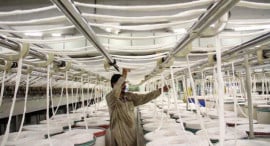
KARACHI: Delinking expansion plans and a possible price war among companies, All Pakistan Cement Manufacturers Association (APCMA) Chairman Muhammad Ali Tabba has said that cement players can exercise their right to target an expansion.
“No one can stop you if you want to increase your capacity because it is the right of the company,” Tabba told The Express Tribune.
When told that capacity expansion can lead to a price war among APCMA players, he said that price war can happen anytime – implying that it is not linked with the expansion plans of any cement maker.
Cement sector is one of the leading sectors that has been outperforming the benchmark Karachi Stock Exchange (KSE) 100-index over the last few years. But analysts say a difference in APCMA on expansion plans has perturbed investors as it may hurt the profitability of the sector.
“It is a matter of the cost of production. Those who are efficient will win the game,” he said when asked about the possibility of a negative impact of the expected price war on smaller cement players.
Some of the leading cement companies are looking to expand that will hurt the smaller players who have a high cost of production owing to higher debt among other challenges.
Pakistan’s installed capacity of the cement industry is 45 million tons, according to APCMA – a lobbying group of the industry. However, the industry is currently utilising just 33 million tons or 73% of its total installed capacity.
Investors’ concern over price fall
Due to high demand, most of the cement plants are eyeing various expansion opportunities (like DG Khan and Cherat Cement) as they are operating near capacity. There is a prevailing market concern that cement prices would fall if big players like Lucky Cement exit the APCMA’s price arrangement.
“We believe cement sector may underperform until there is a clarity on expansion plans, especially by DG Khan Cement,” Sherman Securities reported on Tuesday.
Our detailed discussion with various heads of cement plants suggest that any acquisition of small existing cement plants may dilute the risk of price decline, however, any new capacity buildup may render a price war, the report added.
According to media reports, DGKC is planning to add capacity of 2.5-2.6 million tons in the southern region but our discussion with its management revealed that no formal agreement has been made yet.
Lucky Cement – which enjoys 15-16% share in the domestic market and operating at 88% capacity – carries most cards. Though any cut in cement prices may also affect Lucky, it can afford any price war due to its sound financial position and low dependence on domestic cement sales.
Cement prices may reduce by Rs25-35 per 50-kg bag – as this would be the price on which impact on Lucky’s earnings would be neutral. The company can compensate this loss by grabbing 40-50% market share of smaller players as their operating cost is higher which may render them into losses like Dewan Cement, Al-Abbas Cement, Flying Cement and few others.
Which companies to be impacted most?
Maple Leaf and Fauji Cement are the two major companies that can be affected the most as every Rs10 per 50-kg bag reduction in price may reduce earnings of both companies by 10-12%. As far as the impact on share price is concerned, Maple Leaf (already trading at huge discount) may not see price falling much, the report said.
Whereas, Kohat Cement and Cherat Cement would relatively be less impacted as they are relatively unleveraged. Moreover, their production cost is almost at par with other efficient plants (like Lucky and DG Khan) given the fact that their power cost remained almost unchanged over the years.
Similarly, impact on DG Khan may also be lower due to higher share of exports in its total product mix. However, there remains a concern on allocation of funds for capacity expansion as the company is operating at 90% capacity utilisation.
Published in The Express Tribune, April 9th, 2014.
Like Business on Facebook, follow @TribuneBiz on Twitter to stay informed and join in the conversation.
COMMENTS (1)
Comments are moderated and generally will be posted if they are on-topic and not abusive.
For more information, please see our Comments FAQ























































Good research, kudos to Farhan for a good business article. Maybe a followup on the history of cement cartelization in Pakistan